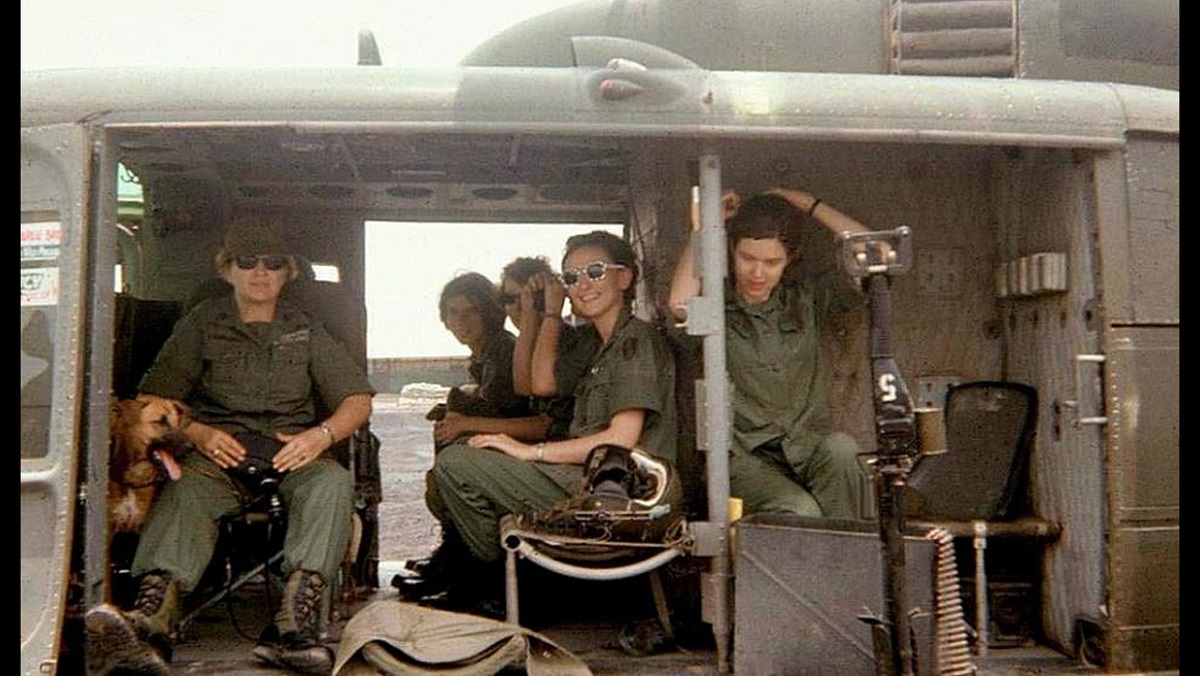
Whenever Kara Dixon Vuic comes through Carlisle, we are sure to bring her into the War Room for a conversation that never disappoints. She joins host Ron Granieri for a wide-ranging discussion about sex, gender, the military and society. They touch on everything from the different experiences of American Red Cross “Donut Dollies” and commissioned professionals in the Nurse Corps to the military leadership’s complicated attitudes towards the “commodification of companionship.” It’s a great conversation that touches on the impact of human nature, societal norms, and the ever-changing conception of gender, and attitudes towards equality of the sexes.
Here you have really professional, trained nurses who outrank the majority of the men they are treating, and yet you’ve got William Westmoreland still saying, “I want nurses to be pretty, have their hair fixed, and wear lipstick and do all these things.” Never mind we’re in a war.
Podcast: Download
Kara Dixon Vuic is the Lance Corporal Benjamin W. Schmidt Professor of War, Conflict, and Society in 20th-Century America at Texas Christian University.
Ron Granieri is Professor of History at the U.S. Army War College and the Editor of A BETTER PEACE.
The views expressed in this presentation are those of the speakers and do not necessarily reflect those of the U.S. Army War College, U.S. Army, or Department of Defense.
Photo Description: Army Nurses in Vietnam, Cu Chi, 1968
Photo Credit: Bobcat Alpha via flickr





From the introduction to our podcast above:
“She joins host Ron Granieri for a wide-ranging discussion about sex, gender, the military and society.”
Question: Might we need to consider such things as sex, gender, the military, etc. (and, indeed, many other topics as well); this, from a “what type of society, exactly, are we taking about here” point of view? For example, as per the two different — and conflicting — types of societies discussed in “Britannica” under the heading of “Gemeinschaft and Gesellschaft:”
“Tönnies’s conception of the nature of social systems is based on his distinction between the Gemeinschaft (communal society) and the Gesellschaft (associational society). In the rural, peasant societies that typify the Gemeinschaft, personal relationships are defined and regulated on the basis of traditional social rules. People have simple and direct face-to-face relations with each other that are determined by Wesenwille (natural will)—i.e., natural and spontaneously arising emotions and expressions of sentiment.
The Gesellschaft, in contrast, is the creation of Kürwille (rational will) and is typified by modern, cosmopolitan societies with their government bureaucracies and large industrial organizations. In the Gesellschaft, rational self-interest and calculating conduct act to weaken the traditional bonds of family, kinship, and religion that permeate the Gemeinschaft’s structure. In the Gesellschaft, human relations are more impersonal and indirect, being rationally constructed in the interest of efficiency or other economic and political considerations.”
And/or, as per the two different and conflicting societies (and/or states-types) addressed in the title — and the text — of the 2005 Catholic University of America, Columbus School of Law paper “Moral Communities or a Market State … ;” therein, see Page 639:
“What has been called the ‘Central Tradition’ of political philosophy has long taught that the ‘state’ is a moral community, indeed, this is the State’s central and defining attribute. The Central Tradition has its roots in Greek political thought. …
In contrast to the teaching that the State is directed to the perfection of life stands the powerful tradition of Liberalism, very roughly, the idea that the proper sphere of State action is limited by private right, and consists for the most part (to use Aristotle’s words) in ‘preventing wrong and promoting exchange.”
(Thus, in one — or both — of these such examples, to see the two different and conflicting societies that one might be see on display on “Yellowstone” currently — and/or in the halls of our Congress today?)
Thus, such things as sex, gender, the military, women in the military and/or women operating in or near the military sphere (etc., etc., etc.); these to be viewed — possibly — from the perspective of/from the standpoint of (a) the conflict between societal types at any given time and (b) which type of society had the upper hand, at any time particular time?
(As an example, if Gemeinschaft (communal society) and/or “moral communities” were to be “winning” at a particular time, then the role of women in society, in and/or near the military, and how these women might be treated therein, this might be entirely different from the role of role of women in society, in and/or near the military, and how these women might be treated if Gesellschaft (associational society) and/or a “market-state” were “winning?”)
At approximately the 23:00 point in this podcast, Dr. Granieri asks Dr. Vuic a question as to whether the experience of women in the military has changed since the advent of the War on Terrorism and/or has changed since the end of the Old Cold War? (This, and as thus stated in the podcast, to potentially address this question from a changing “nature” and/or changing “character” of war point of view?)
Q: But what, exactly, has changed post-the Old Cold War?
A: Post-the Old Cold War:
a. The U.S./the West became the entity that sought to achieve revolutionary change more both at home and abroad (in our case, more along market-democracy lines); herein, working more “by, with and through” the more liberal/the more modern/the more pro-change elements of the states and societies of the world (to include these such elements found here at home in the U.S./the West) to achieve this such objective. And:
b. Entities both here at home in the U.S./the West and there abroad elsewhere (think China, Russia, Iran, N. Korea, the Islamists, etc.) — who were/are dependent upon the status quo for their power, influence, control, status, privilege, safety, security, etc. — and who, thus, were/are existentially threatened by our such revolutionary change initiatives — these folks, now post-the Old Cold War, are the ones who have (a) sought to “contain” and “roll back” these such revolutionary changes; herein, (b) working more “by, with and through” the more conservative/the more traditional/the more no-change elements of the states and societies of the world (to include these such elements found here at home in the U.S./the West).
Question: Does the above depict (a) a change in the “character” of war, (b) a change in the “nature” of war, (c) no change in either the “character” or the “nature” of war, or (d) something else — which, as yet — has not been clearly, correctly and/or properly defined ???
Note that — at approximately the 23:30 point in this podcast — Dr. Vuic says that the experience of women in the military, in some ways at least, have “radically changed” in positive ways — but not changed in other important ways. (This, in the post-Cold War and/or War on Terrorism period?)
As to these such positive “radical changes,” might this have something to do with the information found in sub-paragraph “a” of my comment immediately above?
As to these such non-changes, might this have something to do with the information found in sub-paragraph “b” of my comment immediately above?